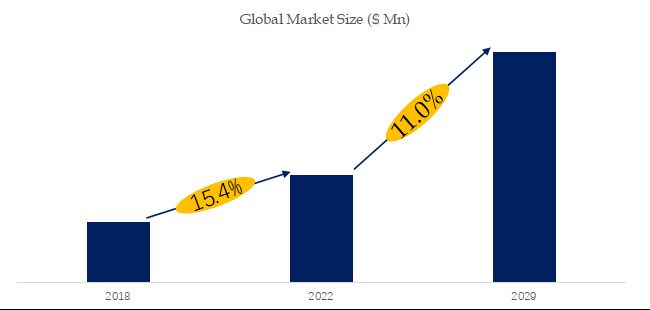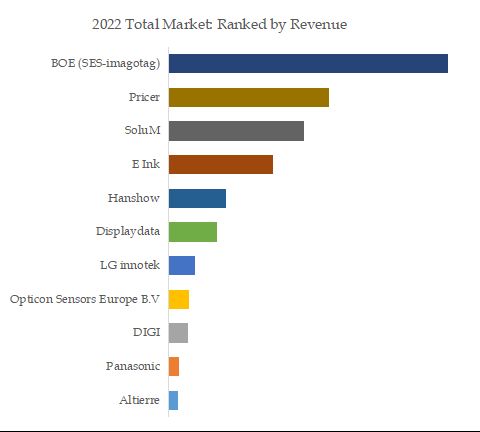Electronic Shelf Label (ESL) Industry Analysis:the global market size is projected to reach USD 2.34 billion by 2029
Electronic shelf labels, also known as ESLs. Based on advanced IT technology, it is the latest solution for inventory and price management in the retail industry. ESL replaces conventional paper price tags on supermarket and department store shelves with LCD and e-paper displays to display product price promotions.
ESL uses low-power wireless communication technology Zigbee to update product prices in real time. ESL consists of labels equipped with electronic paper and a gateway that provides product information. The central server sends information about each product to the gateway, which in turn sends the information to thousands of tags simultaneously.
The electronic shelf label includes a transceiver configured to communicate with a plurality of wireless data tags associated with a plurality of retail products.
According to the new market research report “Electronic Shelf Label (ESL)- Global Market Share and Ranking, Overall Sales and Demand Forecast 2024-2030”, published by QYResearch, the global Electronic Shelf Label (ESL) market size is projected to reach USD 2.34 billion by 2029, at a CAGR of 11.0% during the forecast period.
- Global Electronic Shelf Label (ESL) MarketSize(US$ Million), 2018-2029

Source: QYResearch, "Electronic Shelf Label (ESL)- Global Market Share and Ranking, Overall Sales and Demand Forecast 2024-2030”
- Global Electronic Shelf Label (ESL) Top11Players Ranking and Market Share(Continually updated)

Source: QYResearch, "Electronic Shelf Label (ESL)- Global Market Share and Ranking, Overall Sales and Demand Forecast 2024-2030”
According to QYResearch Top Players Research Center, the global key manufacturers of Electronic Shelf Label (ESL) include BOE (SES-imagotag), Pricer, SoluM, E Ink, Hanshow, Displaydata, LG innotek, Opticon Sensors Europe B.V, DIGI, Panasonic, etc.
In 2022, the global top five players had a share approximately 78.0% in terms of revenue.
Market Drivers:
Providing real-time pricing: The ESL system enables retailers to adjust prices in real time and conduct flexible pricing based on market demand, seasonal changes and other factors. This helps to better respond to market changes and improve competitiveness.
Sustainable development: The use of ESL technology can reduce the use of paper labels, help reduce paper waste and environmental impact, and is in line with the trend of sustainable development.
Technological innovation: With the continuous development of technology, the ESL system is also constantly innovating. For example, improvements such as the introduction of more advanced display technology, integration with the Internet of Things (IoT), and longer battery life have all promoted the development of ESL systems.
Restraint:
Technical standards and interoperability: There may be multiple different ESL technical standards within the industry, which may lead to interoperability issues. Retailers may face the challenge of selecting appropriate technology standards to ensure smooth operation and integration of systems.
Energy requirements: Electronic shelf labels require constant power, so energy requirements can be an issue, especially for large-scale retailers. Providing stable and sustainable power can be a challenge.
Data security and privacy issues: As ESL systems are digitized, large amounts of data related to prices and product information are stored and transmitted. This raises concerns about data security and privacy, especially when dealing with sensitive business information.
Opportunity:
Digital marketing: ESL systems can be used as part of digital marketing to help retailers better interact with consumers and increase sales and loyalty by displaying product reviews, recommending products and providing relevant information.
IoT integration: Integration with Internet of Things (IoT) technology can provide retailers with more data and insights, such as inventory levels, sales trends, and more. This helps in better management of supply chain and inventory.
Environmental protection and sustainability: The use of ESL technology can reduce the use of paper labels, help reduce paper waste, and is in line with the trend of sustainable development. This can also be an opportunity for retailers to project their CSR image in the market.
Emerging Markets: With the rise of emerging markets, especially in the Asia-Pacific region and other regions, the growth of the retail industry has also provided new development opportunities for the ESL industry.
About The Authors
|
|
Ziyi Fan |
|
|
Lead Author |
||
|
Consumer Goods, Equipment & Parts, Packaging, etc. |
About QYResearch
QYResearch founded in California, USA in 2007.It is a leading global market research and consulting company. With over 16 years’ experience and professional research team in various cities over the world QY Research focuses on management consulting, database and seminar services, IPO consulting, industry chain research and customized research to help our clients in providing non-linear revenue model and make them successful. We are globally recognized for our expansive portfolio of services, good corporate citizenship, and our strong commitment to sustainability. Up to now, we have cooperated with more than 60,000 clients across five continents. Let’s work closely with you and build a bold and better future.
QYResearch is a world-renowned large-scale consulting company. The industry covers various high-tech industry chain market segments, spanning the semiconductor industry chain (semiconductor equipment and parts, semiconductor materials, ICs, Foundry, packaging and testing, discrete devices, sensors, optoelectronic devices), photovoltaic industry chain (equipment, cells, modules, auxiliary material brackets, inverters, power station terminals), new energy automobile industry chain (batteries and materials, auto parts, batteries, motors, electronic control, automotive semiconductors, etc.), communication industry chain (communication system equipment, terminal equipment, electronic components, RF front-end, optical modules, 4G/5G/6G, broadband, IoT, digital economy, AI), advanced materials industry Chain (metal materials, polymer materials, ceramic materials, nano materials, etc.), machinery manufacturing industry chain (CNC machine tools, construction machinery, electrical machinery, 3C automation, industrial robots, lasers, industrial control, drones), food, beverages and pharmaceuticals, medical equipment, agriculture, etc.
Contact Us:
If you have any queries regarding this report or if you would like further information, please contact us:
QY Research Inc.
Add: 17890 Castleton Street Suite 369 City of Industry CA 91748 United States
E-mail: global@qyresearch.com
Tel: 001-626-842-1666(US) 0086-133 1872 9947(CN)
EN: https://www.qyresearch.com
JP: https://www.qyresearch.co.jp

English
Simon Lee

English
Hitesh

Chinese
Damon

Japanese
Tang Xin

Korean
Sung-Bin Yoon
Competition
Key players, new entrants,acquisitions, mergers and expansions,development trends and challenges.
Industry Analysis
Rawmaterial, application, product type, demand,supply,downstream, supply chain etc.
Market Size
Capacity, production, sales, revenue, price, cost etc.
Customized Information
We can offer customized survey and information to meet ourclient's need.